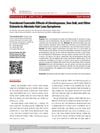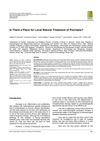 September 2017 in “Journal of Investigative Dermatology”
September 2017 in “Journal of Investigative Dermatology” The combination of Stemoxydine® and Resveratrol improves hair density in women with Female Pattern Hair Loss.
 4 citations,
September 2020 in “Andrologia”
4 citations,
September 2020 in “Andrologia” Oregano extract helps fix testis and sperm damage caused by finasteride.
 2 citations,
July 2020 in “PubMed”
2 citations,
July 2020 in “PubMed” Herbs and fungi can potentially treat hair loss effectively with fewer side effects.
 6 citations,
July 2018 in “Scientific Reports”
6 citations,
July 2018 in “Scientific Reports” Methamphetamine affects gene expression in rat whisker follicles, with key genes linked to addiction.
 4 citations,
March 2021 in “Asian Journal of Beauty and Cosmetology”
4 citations,
March 2021 in “Asian Journal of Beauty and Cosmetology” Dendropanax, sea salt, and other extracts can help reduce hair loss and promote hair growth.
 5 citations,
June 2017 in “in Vivo”
5 citations,
June 2017 in “in Vivo” Vitamin C deficiency changes gene expression, affecting skin and hair health.
 7 citations,
January 2022 in “Molecules”
7 citations,
January 2022 in “Molecules” Tectoridin helps human hair cells grow and makes mouse hair longer, suggesting it could treat hair loss.
 September 2017 in “Journal of Investigative Dermatology”
September 2017 in “Journal of Investigative Dermatology” Mackerel fermented fish oil protects skin cells from damage by UVB light.
 December 2023 in “Journal of Trace Elements in Medicine and Biology”
December 2023 in “Journal of Trace Elements in Medicine and Biology” Molybdenum nanoparticles could be a new treatment for hair loss, working differently than minoxidil.
 2 citations,
August 2020 in “Clinical, Cosmetic and Investigational Dermatology”
2 citations,
August 2020 in “Clinical, Cosmetic and Investigational Dermatology” The hair-growth formula with L-cystine helps protect and grow hair cells.
 63 citations,
March 2016 in “International Journal of Molecular Sciences”
63 citations,
March 2016 in “International Journal of Molecular Sciences” Children with atopic dermatitis often have sleep problems due to itching and may benefit from melatonin, which helps with sleep and skin symptoms.
 September 2017 in “Journal of Investigative Dermatology”
September 2017 in “Journal of Investigative Dermatology” Hair care products used for 4 weeks made hair smoother.
 1 citations,
February 2023 in “International Journal of Molecular Sciences”
1 citations,
February 2023 in “International Journal of Molecular Sciences” Melatonin improves cashmere goat hair quality by increasing follicles and reducing skin aging.
 48 citations,
June 2020 in “Current Rheumatology Reports”
48 citations,
June 2020 in “Current Rheumatology Reports” Different types of fibroblasts play various roles in both healthy and diseased tissues, and understanding them better could improve treatments for fibrotic diseases.
 4 citations,
December 2015 in “Journal of Medicinal Plants Research”
4 citations,
December 2015 in “Journal of Medicinal Plants Research” A plant mixture extract helped grow hair by boosting cell growth and growth factors while blocking a hair loss-related enzyme.
 2 citations,
November 2019 in “Phytotherapy Research”
2 citations,
November 2019 in “Phytotherapy Research” Pea sprout extract is safe and effectively reduces hair loss.
 5 citations,
November 2016 in “Experimental and Therapeutic Medicine”
5 citations,
November 2016 in “Experimental and Therapeutic Medicine” BeauTop improves hair growth in androgenetic alopecia patients.
 10 citations,
May 2012 in “PloS one”
10 citations,
May 2012 in “PloS one” Low ERCC3 gene activity is linked to non-pigmented hair growth.
 January 2023 in “Springer eBooks”
January 2023 in “Springer eBooks” New understanding of hair loss could lead to better treatments.
 January 2008 in “Annals of Nutrition and Metabolism”
January 2008 in “Annals of Nutrition and Metabolism” Parthenolide promotes hair growth in mice and may influence pathways related to male pattern baldness.
 3 citations,
November 2020 in “Biological Trace Element Research”
3 citations,
November 2020 in “Biological Trace Element Research” Men with hair loss may lack zinc, copper, and vitamin D; supplements could help.
 August 2023 in “Natural Resources for Human Health”
August 2023 in “Natural Resources for Human Health” Vegetarians should take B vitamin supplements to avoid health issues.
 15 citations,
May 2018 in “Open Access Macedonian Journal of Medical Sciences”
15 citations,
May 2018 in “Open Access Macedonian Journal of Medical Sciences” Propolis and aloe vera ointment effectively treats mild to moderate psoriasis.
 January 2019 in “Advances in stem cells and their niches”
January 2019 in “Advances in stem cells and their niches” Skin health and repair depend on the signals between skin stem cells and their surrounding cells.
 July 2021 in “Asia-Pacific journal of convergent research interchange”
July 2021 in “Asia-Pacific journal of convergent research interchange” Cauliflower Mushroom extract may help treat male hair loss by affecting hair growth-related genes.
 14 citations,
May 2020 in “Biomolecules & Therapeutics”
14 citations,
May 2020 in “Biomolecules & Therapeutics” Vanillic acid from wheat bran may promote hair growth by activating certain cell pathways and reversing hormone-related hair loss.
 1 citations,
December 2016
1 citations,
December 2016 Researchers created a model to understand heart aging, highlighting key genes and pathways, and suggesting miR-208a as a potential heart attack biomarker.
 6 citations,
July 2021 in “Microbial biotechnology”
6 citations,
July 2021 in “Microbial biotechnology” The combined treatment with engineered bacteria and yellow LED light improved wound healing in mice.
January 2024 in “Cosmetics” Menopause worsens skin, hair, and nails, affecting self-esteem and quality of life.
 4 citations,
June 2018 in “PLOS ONE”
4 citations,
June 2018 in “PLOS ONE” Iron levels are linked to insulin resistance in men and postmenopausal women, but not in premenopausal women.





























